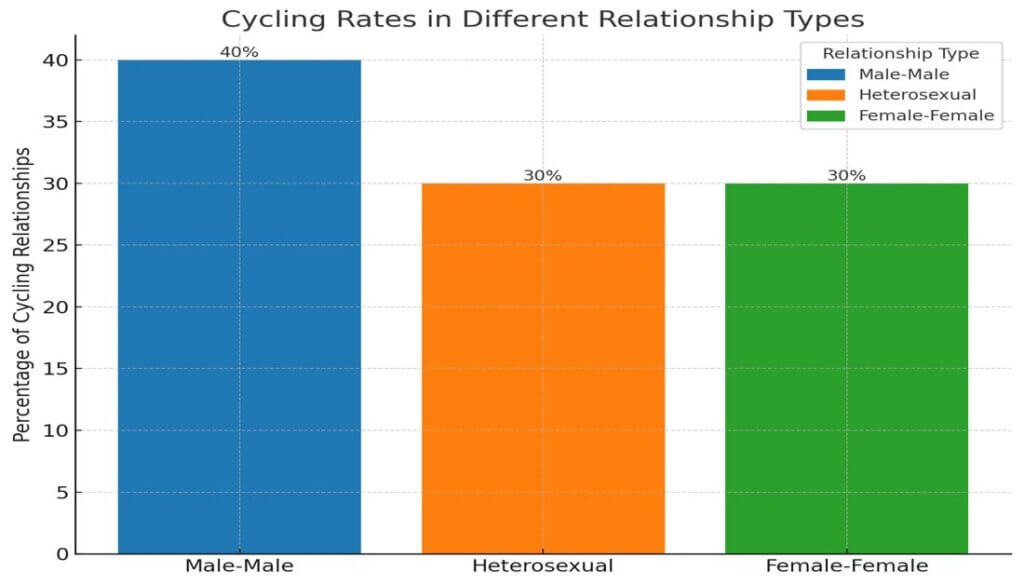Key Takeaways
1. Discover how your mental well-being influences every relationship in your life.
2. Learn how the cycles of on-off relationships can silently influence your mental health.
3. Understand how mental health challenges can create barriers to effective communication in your relationship.
4. Explore how meditation can help you to improve your mental health.
5. Find out how regular meditation can bring clarity, focus, and harmony to strengthen your relationship.
A few days ago, I came across a news article that discussed how our mental health impacts our relationships. I found this topic very intriguing, so I thought, why not delve deeper into it?
You see, relationships are a vital part of human life. Throughout our lives, we have to maintain various relationships, whether with our family, friends, or life partners.
For example, if you are a woman, you have to fulfill the roles of a mother, a daughter, and a wife. Therefore, it’s crucial to understand how our mental health affects these relationships. During my research on this topic.
I discovered that there are five key ways in which our mental health influences our relationships.
In this blog post, we will discuss these aspects and also explore seven meditation techniques that can help improve our mental health, thereby enhancing our relationships. So, without further ado, let’s begin our blog post.
5 Ways Mental Health Shapes Relationships
On-Off Relationships

Recently, Dr. Kale Monk revealed in one of his studies that focuses on on-off relationships. According to his research, 60% of adults experience on-off relationships at some point in their lives.
In this type of relationship, people break up with each other several times and then reconnect after a few days.
This cycle continues repeatedly, and this pattern is referred to as an on-off relationship. It is directly associated with high levels of anxiety and depression, which are closely linked to our mental health.
Dr. Kale Monk suggests that breaking up and getting back together repeatedly isn’t always negative.
Sometimes, it allows partners to realize each other’s absence and understand the value of their relationship, ultimately helping to improve it.
However, if this cycle persists, both partners should consider whether their relationship is becoming toxic.
A study was conducted in which 545 couples participated, including both heterosexual and homosexual couples.
The study aimed to understand how often the cycle of breaking up and then getting back together repeats itself among heterosexual and homosexual couples.
The research found that at least one-third of cohabiting couples experienced a breakup and later reconciled.
It also revealed that this cycle is most prevalent in male-male relationships. In contrast, the cycle is less frequent in heterosexual and female-female couples compared to male-male couples. (Sources)
You can better understand this concept through the diagram provided below.

A bar chart illustrating the cycling rates among different types of couples based on the study data.
The chart shows that male-male couples have the highest rate of cycling, while female-female and heterosexual couples have lower but similar rates.
Mental Health Challenges

When a person’s relationship continuously breaks up and reconciles. And this cycle persists, it has a profoundly negative impact on the mental health of both partners.
This cycle often leads to anxiety and depression for both individuals involved. The uncertainty and instability within the relationship foster feelings of insecurity in both partners, which can lead to stress and emotional issues.
As a result, both partners may experience a decrease in satisfaction and commitment to the relationship. Discontent begins to grow, and it starts having a detrimental effect on their connection.
You might have also noticed in your own life that when you are in a relationship that repeatedly breaks up and gets back together.
It causes significant mental stress, depression, and anxiety. When this happens over and over, you eventually become exhausted by these feelings and start considering ending the relationship for good.
This occurs because the continuous cycle of breaking up and reconciling increases your mental stress, leading to depression, which negatively affects your mental health. Consequently, you begin to contemplate ending the relationship permanently.
Communication Barriers

Communication plays a crucial role in any relationship. You may have experienced or observed in other relationships how misunderstandings can create problems. In some cases, misunderstandings can even lead to the end of the relationship.
One of the main reasons for poor communication in a relationship can be the mental health of the partners.
If one partner is struggling with mental health issues, such as anxiety and depression, they may often misinterpret things.
Misunderstandings arise, and they may find it difficult to openly discuss their needs and concerns with their partner.
This lack of communication can lead to conflicts and create a sense of distance between the partners, ultimately driving them apart.
Commitment Issues

When a person’s mental health is not in a good state, they may struggle to fully commit to their relationship.
Mental health challenges can lead to difficulties, such as fear of the relationship’s future or the uncertainty that comes with it.
They may also harbor a constant fear of being abandoned by their partner. These fears and uncertainties often prevent them from being fully committed to the relationship.
A lack of commitment in a relationship can create a cycle of breaking up and getting back together repeatedly.
This cycle further hinders both partners from fully committing to each other. They live in constant fear, thinking that while the relationship may be stable today, it could fall apart again tomorrow, just like it did in the past. There can be other reasons for commitment issues as well.
For example, if one partner has to move to a different location due to a job or home situation, or if they are burdened with family responsibilities that prevent them from dedicating enough time to the relationship. Additionally, the weight of responsibilities can keep them under constant stress.
Increased Emotional Reactivity

When someone is dealing with mental health issues such as anxiety, depression, or stress, they may experience emotions with heightened intensity.
This means that they might react aggressively to even small things that upset them, such as feeling hurt or criticized, even if the situation wouldn’t be a big deal to others.
Such individuals often find their relationships to be highly stressful because they react aggressively to minor issues, and these reactions can sometimes escalate into major conflicts.
Due to this heightened emotional reactivity, people may start feeling resentment and become defensive toward each other.
For example, if one partner is rigid in their viewpoint, they may be unable to see things from the other partner’s perspective.
This situation creates difficulties for both in understanding and connecting with each other. As a result, it negatively impacts trust and closeness in the relationship, making it unstable and unsatisfying.
The Role of Meditation in Improving Mental Health
So far, we have discussed how mental health issues affect our relationships. Now, let’s explore solutions to this problem.
There are several ways to improve mental health, but one of the most effective methods is meditation.
Let’s discover how meditation can enhance our mental health in seven different ways, ultimately helping us improve our relationships.
Reduction in Stress, Anxiety, and Depression

One of the primary benefits of meditation is its ability to reduce stress, anxiety, and depression. When a person practices meditation regularly, they learn to observe their thoughts.
Typically, individuals experience two types of thoughts: those related to the past and those related to the future.
A person may feel sad by dwelling on past events or become anxious by worrying about the future.
However, through meditation, one learns to control these thoughts and focus on the present moment.
By controlling their thoughts, they avoid being overwhelmed by past memories or future anxieties. As a result, stress, anxiety, and depression naturally diminish.
Additionally, regular meditation leads to a reduction in cortisol levels. Cortisol is a hormone in our body associated with stress. Lower cortisol levels help us feel calm and relaxed.
Enhancing Emotional Control

As mentioned earlier, when someone meditates regularly, they develop the ability to observe their thoughts.
During this process, they practice watching their thoughts without reacting to them, cultivating a sense of detachment.
This helps them gain a deeper understanding of their surroundings and the events happening in their life.
As this practice strengthens, their patience also increases. They become less likely to react impulsively to situations.
As a result, when an event occurs, they can respond to it calmly and thoughtfully. This reduces the likelihood of stress and conflict, leading to improved relationships.
Improved Communication

When someone practices meditation regularly, they become skilled at observing and controlling their thoughts.
This process brings clarity to their thoughts. When your thoughts are clear, it naturally impacts the way you communicate.
Before you share something with someone, it’s essential that you first have clarity about it yourself.
When you have a clear understanding of what you want to convey, only then can you effectively communicate it to the other person.
Similarly, when you meditate, your thoughts become completely clear. As a result, you can express yourself clearly to your partner, leading to better communication and a stronger relationship.
For example, you might have noticed or experienced that when you have to give a presentation or a speech, the first thing you do is practice thoroughly.
You rehearse your speech and understand it well so that when you deliver it, your audience can easily grasp what you’re saying.
Increased Empathy and Compassion

As I mentioned earlier, when you meditate regularly, you develop the practice of observing events or thoughts without reacting to them.
This helps you understand things better. You start seeing things from others’ perspectives, which enables you to better understand your partner’s situation and the challenges they face.
When you deeply understand your partner’s position, you develop empathy and compassion toward them, which strengthens your relationship.
For example, consider a scenario where both husband and wife are working, and the wife has to manage both her office work and household responsibilities.
This can create a significant workload for her, leading to constant stress because juggling both responsibilities can be exhausting.
In such a situation, if the husband tries to put himself in his wife’s shoes and understand her challenges, he will realize how much burden she is carrying.
Balancing office and home responsibilities leaves her so drained that she becomes stressed and may react aggressively to small things.
When the husband meditates regularly and understands his wife’s situation, he begins to show empathy and compassion toward her instead of arguing.
This reduces conflicts between them, and they start understanding each other better. Their relationship improves and becomes more enduring.
Enhanced Mental Clarity and Focus

Regular meditation increases a person’s self-awareness. They begin to understand themselves better, leading to a clearer understanding of what they want and what they don’t want.
Similarly, they gain a deeper understanding of their relationships and what they desire within those relationships.
Once this clarity is achieved, the person stops giving importance to unnecessary things and focuses solely on what is beneficial for improving the relationship.
In this way, the individual gains complete mental clarity regarding their relationship. Their focus remains on the aspects that are essential for the relationship, leading to an overall improvement in their connection with their partner.
Conclusion
Friends, I hope you enjoyed this blog post. If you did, I encourage you to read my other posts where I have discussed various topics related to meditation.
I have been practicing the samarpan meditation method for the past 15 years, and I am a married individual.
Therefore, everything I have shared in this post is based on my personal experiences and the research I have conducted on this topic.
If you have any questions related to this blog post, feel free to ask them in the comment box. I will do my best to answer your questions.
Finally, I would like to emphasize that our mind controls our entire body. The state of our mind affects the state of our body, our thoughts, and our actions.
If our mind is in a good state, it has a positive impact on our entire body and thoughts. This positive effect extends to our surrounding environment and our relationships with others.
Therefore, it is crucial to maintain good mental health. Meditation plays a very important role in keeping our mental health in good condition.
While there are many methods available to improve mental health, I can say from my experience that there is no better and simpler method than meditation.
I hope you will regularly practice meditation to improve your mental health, which will, in turn, improve your relationships. Thank you.
To read my other blogs: Click here